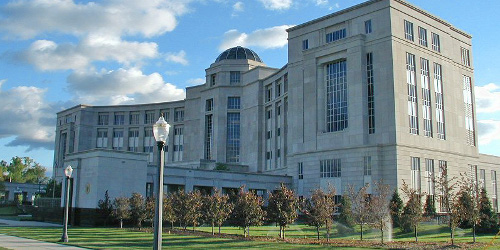
Michigan is now at the epicenter of legal fallout from the U.S. Supreme Court's historic decision to strike down parts of the Defense of Marriage Act. Legal experts across the nation have shifted their focus to two federal court cases, both of which deal with discrimination against gay and lesbian couples that was justified by Michigan's ban on same-sex marriage. The ban was put into effect in 2004. Decisions in both cases could invalidate Michigan's marriage ban, thereby clearing the way for Michigan to become one of the next state's to legalize same-sex marriage.
Although the two federal cases differ on the specific issues – one argues for domestic partner benefits, and the other for marriage and adoption rights – both cases rely on Michigan's marriage ban to justify discrimination against gay and lesbian couples. And in both cases the judges have issued clear statements that they will consider the U.S. Supreme Court's rulings on DOMA when they issue their final decisions on whether the discrimination is constitutional or not.
Domestic Partner Benefits
The first case, Bassett v. Snyder, challenged a 2011 law that took away domestic partner benefits for certain public employees. On June 29, Federal Judge David Lawson, of the Eastern District of Michigan in Detroit, temporarily prevented the law from taking effect. Technically speaking, Lawson did not conclude that Michigan's marriage law was unconstitutional. But that may be the practical effect of the decision, if it were to be sustained after trial and appeal.
"The unavoidable conclusion is that Public Act 297 contains a discriminatory classification on the basis of sexual orientation," Lawson said, referring to gays and lesbians as he ordered the injunction.
The statute, which became law in December 2011, provides that a public employer can provide benefits to a person living with an employee only if that person is married to the employee, a dependent of the employee under federal law, or otherwise eligible under Michigan law to inherit from the employee. Since Michigan law makes marriage (or dependency or eligibility for inheritance) a prerequisite for a live-in partner of a public employee to receive benefits, and the Michigan Constitution, prohibits same-sex partners from marrying, then gay and lesbian couples cannot be eligible for benefits under the statute.
Three of the five plaintiff couples in Bassett allege that they would get married if Michigan law allowed it; and a fourth was married in California when same-sex couples could marry there, but Michigan does not recognize that California marriage. The fifth couple held a commitment ceremony in 2004; the opinion does not indicate whether they would be married but for the Michigan constitutional prohibition.
In granting a preliminary injunction to the plaintiffs, the judge concluded that the law in effect, establishes a form of discrimination on the basis of sexual orientation, when read in conjunction with the Michigan constitutional provision making same-sex couples ineligible to marry.
"Although the act does not use the term 'sexual orientation,'" Lawson wrote, "it both explicitly incorporates statutes that draw classifications based on sexual orientation and renders access to benefits legally impossible only for gay and lesbian couples." Michigan law as a whole, in other words, "permit[s] benefits to be extended only to married couples while barring same-sex couples from marrying."
"We're breathing a sigh of relief right now," said Peter Ways, an Ann Arbor teacher whose partner would have lost his benefits. "This law was clearly meant to target families like ours and to make us feel as though we didn't count."
"This law served no purpose to the state of Michigan other than to needlessly discriminate against hard-working families," said Kary L. Moss, executive director of the ACLU of Michigan. "It's hard to encourage talented people and their families to work for public employers in Michigan when they're denied the ability to take care of each other."
Adoption and Marriage
In the second case, Federal Judge Bernard Friedman denied the State of Michigan's motion to dismiss the case of a Hazel Park lesbian couple seeking to marry and to adopt their children. April DeBoer and Jayne Rowse sued the State of Michigan and the County of Oakland because as a same-sex couple they are not allowed to be issued a marriage license, and they are not allowed joint adoption for their children.
In his decision not to dismiss the case, Judge Friedman wrote, "The U.S. Supreme Court's recent decision in United States v. Windsor has provided the requisite precedential fodder for both parties to this litigation… The Supreme Court has just invalidated a federal statute on equal protections grounds because it 'place(d) same-sex couples in an unstable position of being in a second-tier marriage.' Moreover, and of particular importance to this case, the justices expressed concern of the natural consequence of such discriminatory legislation would not only lead to the relegation of same-sex relationships to a form of second-tier status, but impair the rights of 'tens of thousands of children now being raised by same-sex couples' as well. This is exactly the type of harm plaintiffs seek to remedy in this case."
Attorney Dana Nessel, who represents the lesbian couple, explained the court process. "The motion to dismiss was pending. He's allowing the case to move forward, with a hearing on July 10. At that hearing he will ask if either side has any evidence to present in trial.
"They (the State) could bring in experts or they could decide to cross-examine April and Jayne. But they have already agreed that there is no issue of fact in the case, only an issue of law. There are no facts that we need to dispute, so hopefully there will not be any evidence to present. If this is just a matter of law, we will move forward on a motion for summary judgment. The judge will read briefs from both sides and make his decision from there."
Read the original reporting on the Hazel Park couple online at www.pridesource.com.










